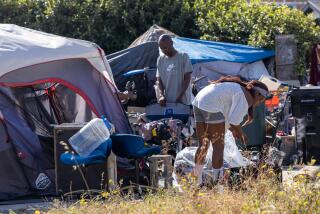Mentally Ill Homeless
It was wonderful reading “Homes for Those on the Bottom Rung: The mentally ill find dwellings through three innovative projects in Los Angeles area” (editorial, Jan. 9). There is certainly a major need for these types of projects. According to the most recent study on the number of homeless people in Los Angeles County, on any given night there are between 43,000 and 77,000 single adults and family members who are homeless; 50% are single men, 25% are families, 13% are single women and 12% are youth. Out of that total, on any given night, 8,600 to 15,400 are the mentally ill homeless.
In spite of the environmental and social disasters, housing remains a major issue. In the editorial, there was no mention of housing in one of the poorest, least developed and most economically depressed areas of the county--South-Central Los Angeles. After many years of planning, meetings and collaborations, with the help and support of Councilman Mark Ridley-Thomas, the Coalition of Mental Health Professionals and A Community of Friends are planning a housing project/community counseling center for South-Central.
We at the Coalition of Mental Health Professionals see the need on a daily basis. In our community outreach and through the delivery of psychological services to South-Central residents, we see the procession of homeless people navigating the streets and alleys with their grocery carts.
We are regularly involved with homeless mentally ill individuals who are in great need of safe, decent and clean housing. That need was greatly evidenced during the recent torrential rainstorms and floods. The need for decent housing for the homeless mentally ill is a 365-day-a-year need in South-Central Los Angeles.
We have seen this need worsen over the past 20 years. We are planning to improve the condition of the housing crisis among the homeless mentally ill in South-Central. It is also our plan to provide them the psychological services denied them and so many other non-chronically mentally ill in South-Central. These underserved individuals are also a part of America and deserve the right to have a stake in its future.
SANDRA E. COX Ph.D.
Coalition of Mental Health Professionals
Los Angeles


